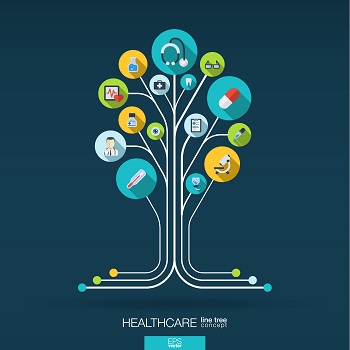 The Centers for Medicare and Medicaid Services (CMS) awards incentive payments to eligible health professionals and hospitals that demonstrate meaningful use of certified electronic health record technology. Compliance with the meaningful use (MU) guidelines established by CMS is intended to improve efficiency and quality through the use of these patient-centered tools.
The Centers for Medicare and Medicaid Services (CMS) awards incentive payments to eligible health professionals and hospitals that demonstrate meaningful use of certified electronic health record technology. Compliance with the meaningful use (MU) guidelines established by CMS is intended to improve efficiency and quality through the use of these patient-centered tools.
In order to receive payment, providers must meet various, specific core measures and objectives that fall under three consecutive stages. One such core measure under Stage 1 focuses on the requirements of a patient portal system. Providers must give at least 50% of patients a way to view online, download and transmit their health information. Under Stage 2 requirements, while 50% or more of patients still must have electronic access to their health information, 5% of patients must be actively using the service to view, download and transmit their data. Stage 3 requirements are still under development.
To satisfy Stage 1 and Stage 2, an approved portal system must include and make available the health information listed below:
- Patient name
- Admit and discharge date and location
- Reason for hospitalization
- Care team, including the attending of record, as well as other providers of care
- Procedures performed during admission
- Current and past problem list
- Current medication list and medication history
- Current medication allergy list and medication allergy history
- Vital signs at discharge
- Laboratory test results available at time of discharge
- Summary of care record for transitions of care or referrals to another provider
- Care plan field(s), including goals and instructions
- Discharge instructions for patient
- Demographics maintained by hospital (sex, race, ethnicity, date of birth, preferred language)
- Smoking status
At Glendale Adventist Medical Center, a not-for-profit hospital in the Los Angeles suburb of Glendale, California, this data is provided to patients through a secure online system known as My Adventist Health. Patients are invited to sign up and create a profile on the portal by providing a valid email address upon hospital admittance and then verifying their identity with their date of birth and a self-selected password to create an account.
The process to sign up and access My Adventist Health is relatively quick and easy. However, successfully meeting the participation thresholds under Stage 2 meaningful use is not a given. For one, hospital staff may not understand or be aware of the pressing implications to invite patients to actively engage with the online portal and even if they do, allocating the time and the bandwidth to focus on this effort may be a challenge as well. As a result, Glendale Adventist Medical Center is leveraging COPE Health Solutions’ Clinical Care Extenders to fill in the gaps.
COPE Health Solutions partnered with Glendale Adventist Medical Center to support this initiative in December 2014 and will continue through September 2015. Over the course of the engagement, COPE Health Solutions is responsible for recruiting and training Clinical Care Extenders, managing scheduling and quality rounding to ensure proper execution. Glendale Adventist Medical Center is focused on educating hospital staff about both the portal itself and the Clinical Care Extender role in this project in addition to, maintaining a secure information technology database.
Successful attainment of MU patient electronic access indicator CH2.1-09.b requires a minimum of 5% active patient engagement with the online portal. However, the target for Glendale Adventist Medical Center under the COPE Health Solutions agreement is an average of 10-15% patient engagement over the duration of the reporting period.
 “It has been my pleasure to collaborate with COPE Health Solutions’ team members to improve our process of getting information to our patients. The Clinical Care Extender has played an integral part of the success of GAMC, My Adventist Health, patient portal engagement.”
“It has been my pleasure to collaborate with COPE Health Solutions’ team members to improve our process of getting information to our patients. The Clinical Care Extender has played an integral part of the success of GAMC, My Adventist Health, patient portal engagement.”
– Grace Chung, RN, Clinical Information Systems Educator
The pilot cohort of Clinical Care Extenders completed training and officially began engaging patients on January 21, 2015. This initiative required dedicating CCEs from Sunday through Saturday at specific times on the floor for two-hour shifts, making rounds and visiting various departments to get patients enrolled in the portal. Essentially, Clinical Care Extenders introduce and explain the resources offered on the patient portal interface to both patients and family members, retrieve their email address and guide them in setting up a profile. During a typical two-hour shift, one Clinical Care Extender estimated that he could visit at least four hospital units to interact, educate and enroll patients; although, he noted that a large geriatric and English as a second language population sometimes impeded the speed.
Despite challenges, the patient engagement percentage each month has surpassed the 5% minimum threshold that CMS has designated since the pilot was launched in January 2015 (see figure 1). Since March 2015, Glendale Adventist Medical Center has met the 10% target with support from COPE Health Solutions. Future efforts will aim to increase and target linguistically-fit CCE participation to cater to our Armenian population, ensure successful meaningful use demonstration and further engage patients for better health outcomes.
Special thanks to our pilot CCEs for their compassion and dedication to engaging and educating the patients on managing their care at GAMC through MyAdventistHealth!
De Alcorn, Daniel Bishay, Tiffany Chung, Elijah Dia, Erika Duell, Aron Escoto, Andrew Esposo, Alexa Fajardo, Carolina Garcia, Glaylee Gomez, Maja Kancevic, Jeffrey Massin, Nancy Phang, Magaly Rubio, Fatima Saddiqi, Kimberly Saenz, Min Sung, Jonathan Toker, Susan Trabue and Elizabeth Zurita

